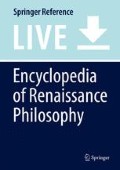Abstract
Georgios, Gennadios II (Scholarios), was the first Ecumenical Patriarch of Constantinople (1454–1456) after the capture of Constantinople (1453) by the Ottomans, an anti-unionist, an Aristotelian, and surprisingly a Thomist. He was committed to theology, but he also studied, taught, commented on, and engaged in philosophical arguments. He was a member of the Greek delegation at the Council of Ferrara-Florence (1438–1439), a Byzantine author marked by abundant inventiveness, a monk, and an opponent to everything that contradicted the faith of Roman Orthodox Church (Platonism of George Gemistos-Pletho, new theological trends, a union of expediency, the Ottoman threat, etc.). Scholarios embraced Thomas’ scholasticism because Thomas also promoted the view that philosophy does not contradict theology. He regards Thomas to be infallible in most theological matters except those that are not in accord with Roman Orthodox Church. He composed theological and philosophical treatises, studied and commented Aristotle’s works, translated scholastic writings, and synthesized epitomes. Scholarios is one of the last great representatives of Byzantine learning because he articulated an authentic approach to theology based upon the Christian patristic tradition and philosophy.
References
Primary Literature
Bryennios, Joseph. 1768. Μετὰ Ἰωσήφ Μοναχοῦ τοῦ Βρυέννιου τὰ εὐρεθέντα. Τ. Α’, ed. Εὐγένιου Βούλγαρη. Λειψία: Τυπογραφία του Βρεϊτκόπφ.
Gennadios, George. 1928–1936. Oeuvres completes de Gennadios Scholarios, ed. L. Petit, Χ. Siderides, and Μ. Jugie, T. 1–8. Paris: Maison de la Bonne Press.
Mark of Ephesus. 1923. Marci Ephesii Morientis Oratio ad Amicorum coetum, ac Nominatim ad Georgium Scholarium. In Patrologia Orientalis, XVII, ed. L. Petit, 484–491. Paris.
Secondary Literature
Blanchet, M.–H. 2008. Georges–Gennadios Scholarios (vers 1400–vers 1472). Un intellectuel Orthodoxe face à la disparition de l’empire Byzantin. Archives.
Demetracopoulos, John A. 2007. Georgios Gennadios II – Scholarios’ Florilegium Thomisticum II (De fato) and its anti-Plethonic tenor. Rech Théol Philos Médiév 74 (1): 301–378.
Karamanolis, G. 2002. Plethon and Scholarios on Aristotle. In Byzantine philosophy and its ancient sources, ed. K. Ierodiakonou. Oxford: Oxford University Press.
Livanos, C. 2003. The conflict between Scholarios and Plethon: Religion and communal identity in early modern Greece. In Modern Greek literature: Critical essays, ed. G. Nagy and A. Stavrakopoulou, 24–41. London/New York: Routledge.
Livanos, C. 2006. Greek tradition and Latin influence in the work of George Scholarios: Alone against all of Europe. New York: Gorgias Press LLC.
Plested, M. 2012. Orthodox readings of Aquinas. Oxford: Oxford University Press.
Sinniosoglou, N. 2011. Radical platonism in Byzantium: illumination and utopia in Gemistos Plethon. Cambridge: Cambridge University Press.
Steiris, George. 2016. Byzantine philosophers of the 15th century on identity and otherness In The problem of modern Greek identity: From the ecumene to the Nation–State, ed. G. Steiris, S. Mitralexis, and G. Arabatzis, 173–200. Athénes: Cambridge Scholars Publishing.
Steiris, George, and Nasia Lyckoura. 2013. La perception et valorization de la philosophie arabe dans le Résumé de la Somme théologique de Saint Thomas d’Aquin de Georges Gennade Scholarios: les cas d’Avicenne et Averroès. In Marges de la Philosophie Byzantine, ed. G. Arabatzis, 51–74. Institut du Livre – A. Kardamitsa: Athènes.
Tinnefeld, F. 2002. Georgios Gennadios Scholarios. In La théologie byzantine et sa tradition. II (XIIIe–XVIIIe s.), ed. C.G. Conticello, and V. Conticello, 479–549. Turnhout: Brepols.
Ζιάκα, Α. 2013. Για μια θεολογία των Θρησκειών, Γεννάδιος Σχολάριος και ο συμφιλιωτικός του λόγος με το Ισλάμ. Θεολογία 2: 193–208.
Παπαδόπουλου, Σ. Γ. 1967. ΕΛΛΗΝΙΚΑΙ ΜΕΤΑΦΡΑΣΕΙΣ ΘΩΜΙΣΤΙΚΩΝ ΕΡΓΩΝ, ΦΙΛΟΘΩΜΙΣΤΑΙ ΚΑΙ ΑΝΤΙΘΩΜΙΣΤΑΙ ΕΝ ΒΥΖΑΝΤΙΩ, ΣΥΜΒΟΛΗ ΕΙΣ ΤΗΝ ΙΣΤΟΡΙΑΝ ΤΗΣ ΒΥΖΑΝΤΙΝΗΣ ΘΕΟΛΟΓΙΑΣ. Doctoral dissertation, University of Athens, Athens.
Author information
Authors and Affiliations
Corresponding author
Editor information
Editors and Affiliations
Section Editor information
Rights and permissions
Copyright information
© 2019 Springer Nature Switzerland AG
About this entry
Cite this entry
Lyckoura, N. (2019). Scholarios, George. In: Sgarbi, M. (eds) Encyclopedia of Renaissance Philosophy. Springer, Cham. https://doi.org/10.1007/978-3-319-02848-4_831-1
Download citation
DOI: https://doi.org/10.1007/978-3-319-02848-4_831-1
Received:
Accepted:
Published:
Publisher Name: Springer, Cham
Print ISBN: 978-3-319-02848-4
Online ISBN: 978-3-319-02848-4
eBook Packages: Springer Reference Religion and PhilosophyReference Module Humanities and Social SciencesReference Module Humanities

